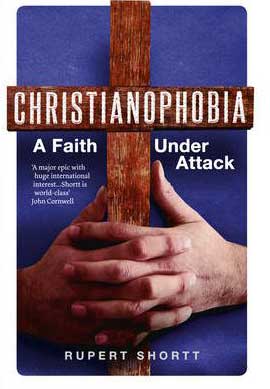
Christianophobia by Rupert Shortt (Rider)
If, like me, you associate the term “Christianophobia” with images of aggrieved B&B owners in right-wing newspapers claiming persecution because they aren’t allowed to discriminate against gay people, then you may find the name of this book off-putting.
It’s worth persevering, though, because Rupert Shortt, religion editor of the Times Literary Supplement, has written a much more subtle and insightful book than the clunky title might suggest – and the issues he seeks to address are far more serious than the varieties of special pleading often associated with this term.
Early on, Shortt spells out that “none of the opinions, insults or laws judged offensive by many Western Christians amount to persecution as chronicled in the pages ahead”. His concern is rather for the Christians across the globe who have “lost loved ones, homes, livelihoods or career prospects because of their faith.”
The problems Shortt documents will be familiar to many New Humanist readers. In a number of Muslim-led countries, draconian blasphemy laws are used against those who dissent from the majority faith – and Christians can be on the receiving end simply for expressing their creed. Many nations still have brutal punishments for “apostasy”. Those choosing to convert from Islam to Christianity face ostracism, discrimination or even death.
As a minority religious group in a society defined by those in power as exclusively “Islamic”, Christians from Iran to Indonesia are often labelled outsiders and face systematic discrimination.
The situation has been especially brutal in Egypt, and Iraq, where long-standing Christian communities have been made scapegoats for the actions of Western governments, and subjected to horrific violence. Even in ostensibly secular Turkey, according to Shortt, Islam is widely held to be inseparable from the national identity, and the idea that it is possible to be both a Turk and non-Muslim is fiercely contested.
Christians still face severe abuse in many Communist and post-Communist countries – from China and North Korea to Cuba and Belarus, where Christians are suspected of being agents of western subversion, and organised religion is seen as a threat to the power of the ruling party.
In India, Christians have been massacred by Hindu extremists, amid a culture of impunity linked to corrupt and ineffective policing. In Nigeria, the authorities have been similarly negligent in dealing with a cycle of tit-for-tat killings between the Christian and Muslim communities.
Christians also face problems in Israel and Palestine, where, according to Shortt, the Arab followers of ancient churches often find themselves “caught in the middle: mistrusted and disliked by the hard men among Israeli and Palestinian alike”.
One obvious conclusion we could draw from this book is that religious minorities – including Christians – fare better in societies where freedom of speech and other basic human rights are protected, where the state remains neutral over matters of faith, and where the national identity is not defined in terms of one particular religion.
Shortt quotes approvingly from a recent statement by the World Council of Churches, which many secularists will find it easy to agree with: “Trying to make the state a religious state, Jewish or Islamic, suffocates the state, confines it within narrow limits, and transforms it into a state that practices discrimination and exclusion, preferring one citizen to another. We appeal to both religious Jews and Muslims: let the state be a state for all its citizens, with a vision constructed on respect for religion but also on equality, justice, liberty and respect for pluralism, and not on domination by a religion or a numerical majority.”
So it seems unfortunate that Shortt repeatedly refers disparagingly to the western “secularists” who should be natural allies of all those concerned about religious intolerance – and seems to equate secularism with opposition to religion rather than simple neutrality.
This should, however, take nothing away from the book’s core message. Citing the World Evangelical Alliance, Shortt estimates that over 200 million Christians worldwide are at risk of religious discrimination or abuse – more, at least in numerical terms, than any other faith group.
Whether or not he’s right about those numbers, the examples he cites in this book alone show that this is a problem to which anyone concerned about religious freedom should pay serious attention.

